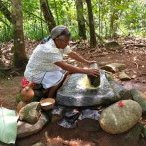English · Español

30 de septiembre de 2016 | Entrevistas | Financiarización de la naturaleza | Anti-neoliberalismo | Bosques y biodiversidad | Derechos humanos | Justicia climática y energía | Soberanía Alimentaria
Bribri people rejects REDD+ projects in Costa Rica
Interview with Mariana Porras of Coecoceiba – Friends of the Earth Costa Rica
Descargar: MP3 (3.2 MB)
Coecoceiba and the Costa Rican Federation for the Conservation of the Environment (FECON) demanded respect for the declaration of the Bribri people of Talamanca in rejection to the “Reducing Emissions from Deforestation and Degradation national strategy”. They denounce that this strategy, promoted in the country and included in national policies and contributions to climate change mitigation is a false solution to the climate crisis.
The REDD strategy development process began in 2008 in Costa Rica with the support for the Forest Carbon Partnership Facility (FCPF) of the World Bank. Since its origins, it has ignored the rights of indigenous people. Particularly, the process violates the right to free, prior and informed consultation included in ILO Convention 169. It also breaches UN declarations that demand an active participation by communities according to their traditions, permanent communication among the parties, culturally appropriate proceedings, information about potential risks, including environmental risks, among other things.
After eight years of REDD promotion in Costa Rica, the Bribri indigenous communities have not had access to information that allows them to weigh the implications of these “climate businesses”. For this reason, on July 1st they delivered a declaration with over 300 signatures to the local government, expressing the rejection of over 15 Bribri communities against REDD+.
The declaration is categorical: “By making use of our right to consultation, we have decided to reject the REDD+ project, its consultation project, and any modification to the name of the project, and we declare the Bribri territory of Talamanca free from REDD+ from now onwards”. The declaration also states that “taking care of forests is a right and an obligation for every person and institution; for the Bribri people, the use of natural resources in medicine, housing, education, spirituality and life in all its complexity, are cultural and traditional worldviews”.
They point out that native peoples should be ensured their free determination in light of any initiative, legislation or project, considering their times and procedures for analysis and decision making. They remind that “the territories of the peoples are collective, not individual lands, and therefore, all negotiations by these peoples should be collective, consensual and participatory”. They add that “the REDD+ project is a way to colonize in the name of development and the needs of people”. So communities decide to disregard all the REDD+ process and to declare the entire Bribri territory free from REDD+.
In the eight years of the REDD process in Costa Rica, the government has spent over 6.7 million dollars in workshops and studies to try and convince the indigenous people to sell their forests, with the excuse of climate change mitigation.
By the end of August, the Costa Rican House of Representatives ratified the UN Paris Climate Agreement and national contributions. The country aims to be “carbon neutral” by 2100, but without any technical support. In practice, this has allowed to increase import, and therefore fossil fuel burning, by 6 per cent. 70 per cent of the Costa Rican energy matrix is fossil-fuel-dependent (60 per cent is consumed by the transportation sector), which amounts to 4.5 per cent of the GDP. This is in direct contradiction with the idea of a country of clean and sustainable energy.
Real World Radio interviewed Mariana Porras, member of Coecoceiba – Friends of the Earth Costa Rica. Mariana told us about the joint struggle of Bribri communities with environmental groups. She also talked about processes such as the increase of the areas destined to the payment for environmental services in her country and the development of the emerging carbon market. She also made reference to the contradictions between the green image portrayed by Costa Rica at international level and certain national indicators that show that we are advancing in the wrong direction, for instance an environmental footprint that exceeds the country´s capacity, the promotion of export-oriented agriculture or the advance of REDD+ mechanisms on indigenous territories without consulting affected communities.
Imagen: http://blog.kuoni.es/








